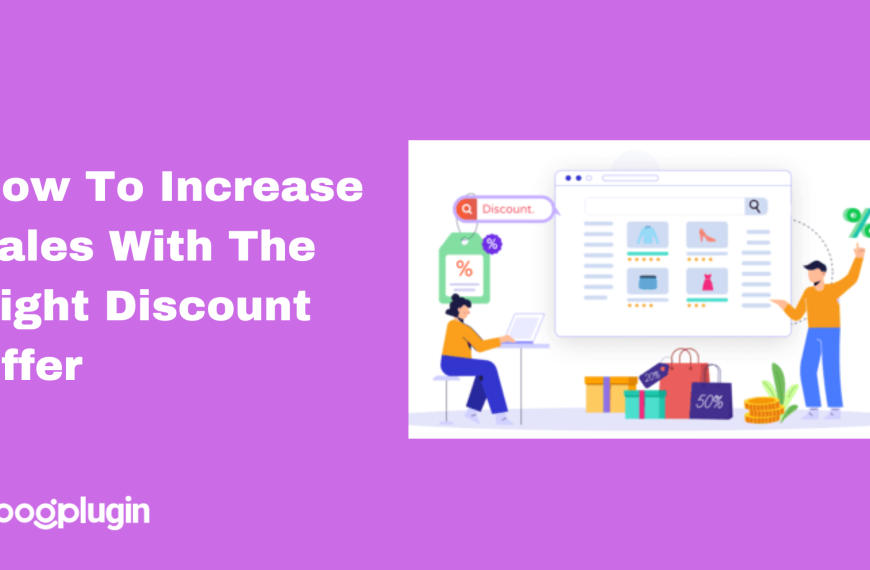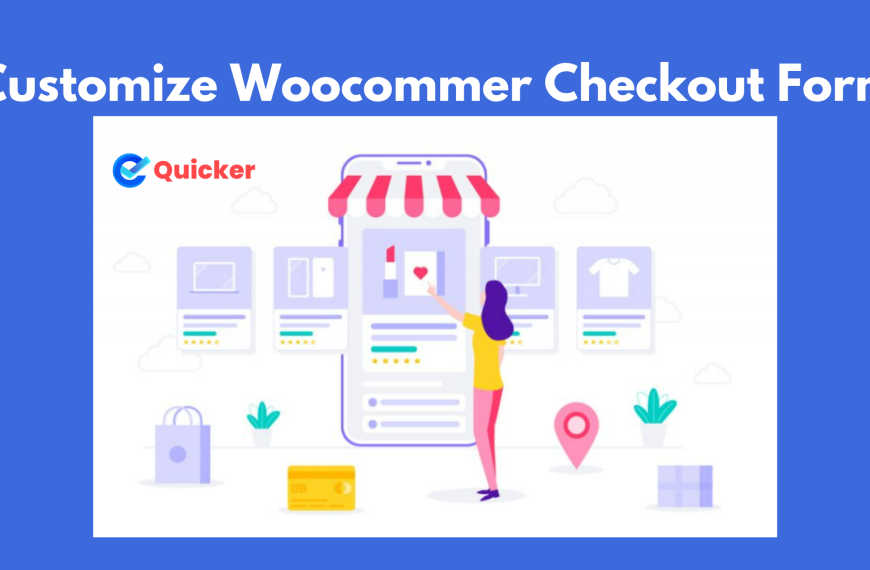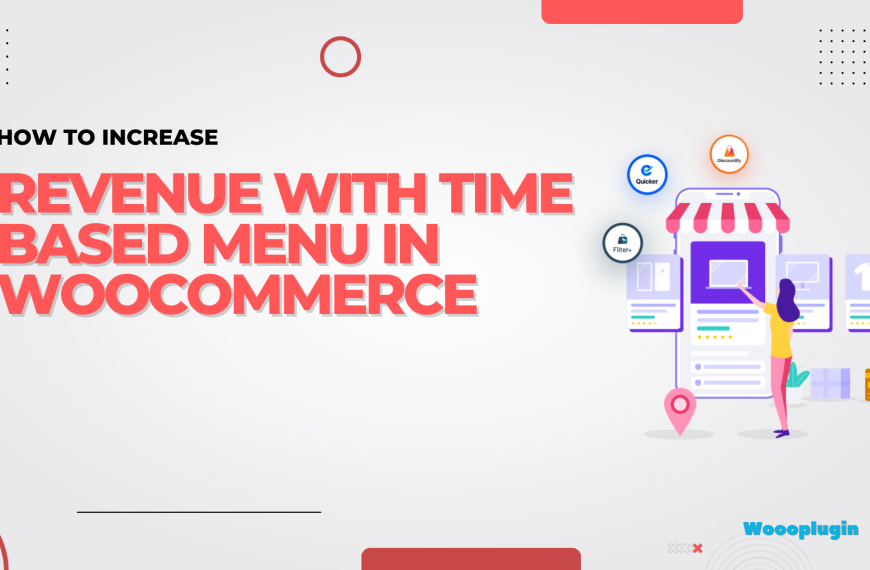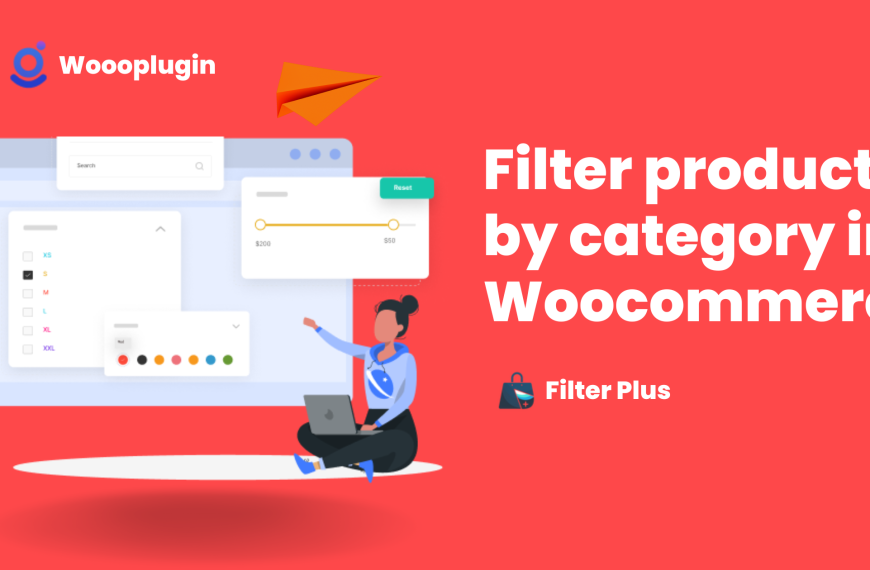Imagine this:
A cluttered online store, overwhelmed by a seemingly endless stream of products. Finding your desired item becomes a time-consuming and frustrating ordeal. This is a common issue faced by many online shoppers, leading to decreased customer satisfaction and higher bounce rates.
Uh hu, no way.
💡 The Solution: WordPress Filter Plugins
WordPress filter plugins offer a powerful solution to this problem. These plugins enable users to narrow down their search results based on specific criteria, such as price, color, size, or category. By providing shoppers with the ability to filter products, you can significantly enhance their navigation experience and increase the likelihood of conversions.
In the competitive world of eCommerce, user experience (UX) can make or break your business. The better you can help visitors find what they’re looking for, the more likely they are to convert. Now, if you run a WooCommerce store, you’ve probably felt the frustration of scrolling endlessly through product pages to find that one item buried under an avalanche of options.
As your store grows, the more crucial it becomes to streamline the shopping experience. This is where WordPress filter plugins come in. These handy tools help your customers narrow down their search in a matter of seconds, allowing them to filter products by categories, price, size, color, and more. But what exactly is a WordPress filter plugin, and why does your WooCommerce store need one? In this blog post, we’ll break down the essentials, dive into real-world examples, and show you why your business can’t afford to skip this feature.
What is a WordPress Filter Plugin?
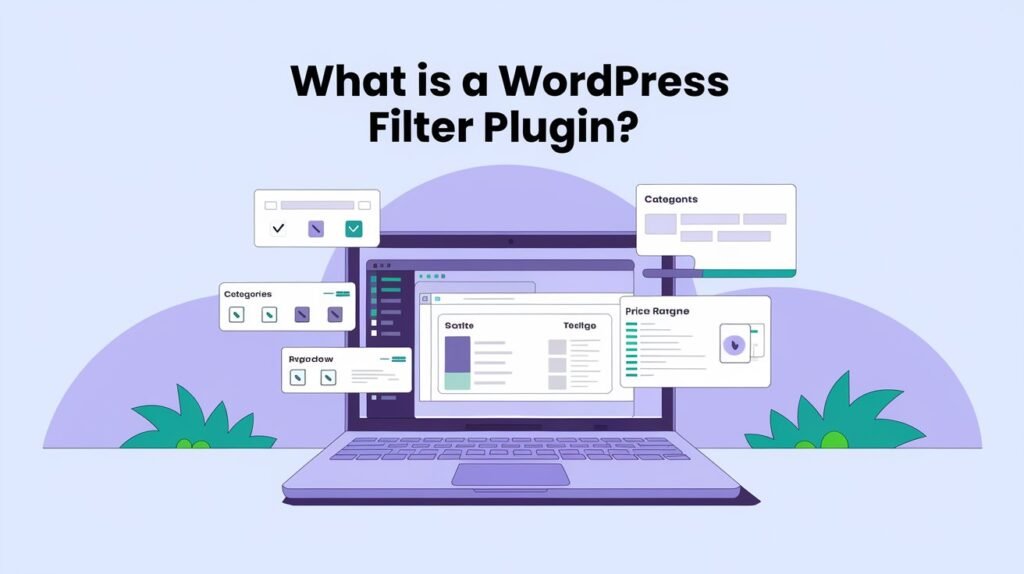
A WordPress filter plugin is a versatile tool that allows you to add filtering capabilities to your website. It works by creating interactive menus or drop-down lists that enable users to refine their search results based on predefined criteria.
If you’ve ever shopped on large eCommerce platforms like Amazon or eBay, you’re familiar with the concept of filters, even if you didn’t realize it at the time. Filters allow users to narrow down search results by specifying certain criteria like price range, color, size, and category. A WordPress filter plugin does the same thing but is tailored specifically for WordPress sites and WooCommerce stores.
These plugins integrate seamlessly with your WooCommerce setup to help your customers find what they’re looking for more efficiently. Rather than scrolling through hundreds of products, a user can simply click on predefined filters to refine their search based on their preferences. Think of it as adding a personal shopper to your website, guiding users to the products they want.
😩 Common Types of Filters:
There are different types of product filters you can use on your WooCommerce store. Here they are:
Price range filters: Allow users to specify a minimum and maximum price range for their search.
Category filters: Enable filtering by predefined categories, such as “Clothing,” “Electronics,” or “Home Goods.”
Attribute filters: Provide options to filter by product attributes, like color, size, or material.
🤩 Key Features of WordPress Filter Plugins
Filtering by Categories: Let’s say you run a WooCommerce store that sells outdoor equipment. A filter plugin can allow your users to quickly sort by “Camping Gear,” “Fishing Equipment,” or “Hiking Supplies,” saving them time and effort.
Filtering by Product Attributes: If you sell clothing, for example, your customers might want to filter items by size, color, or brand. This feature ensures that users see only the items that meet their specific needs.
Filtering by Price Range: One of the most popular filters in any eCommerce store is the price filter. This allows users to set a budget and see only the products that fit within their price range.
Taxonomy filtering: Enables filtering based on custom taxonomies, such as brand, material, or style.
Ajax Loading: Many advanced WordPress filter plugins use Ajax loading, which means filters will update the product results dynamically without refreshing the entire page—creating a seamless experience.
💡 Real-world example: Walmart’s website allows users to refine their search by categories, ratings, and price ranges, helping users narrow down their options in seconds. WordPress filter plugins bring similar functionality to your WooCommerce store.
How WordPress Filter Plugins Improve User Experience
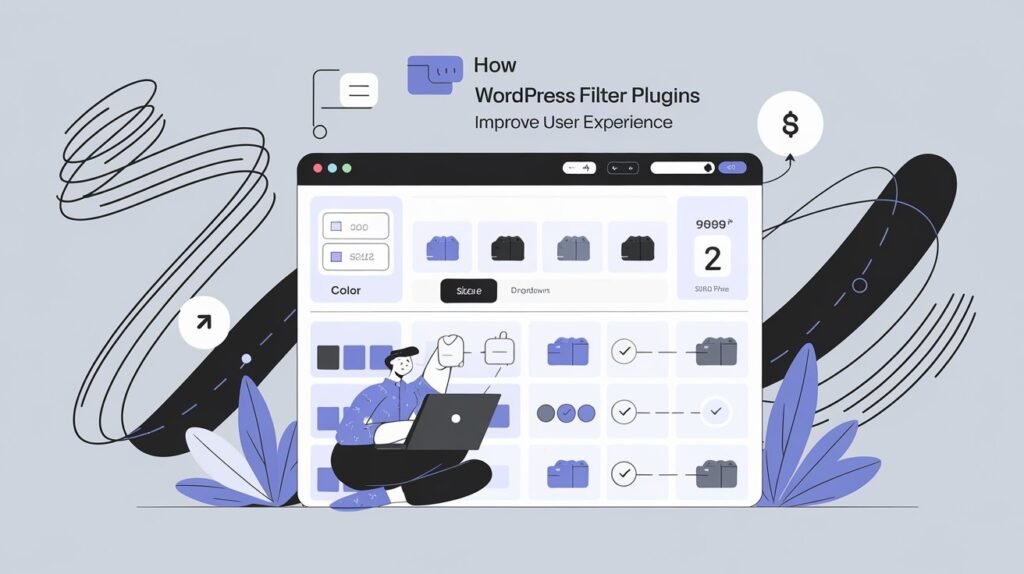
Your WooCommerce store could have the most fantastic products, competitive pricing, and stunning visuals, but if your users struggle to navigate the site, they’ll bounce before adding anything to their cart. Statistics show that 88% of online consumers are less likely to return to a website after a bad experience. So, what can filter plugins do to ensure your users stick around?
By incorporating a WordPress filter plugin into your WooCommerce store, you can significantly enhance the user experience for your customers. Here’s how:
Enhanced Navigation
A filter plugin makes navigation more intuitive by giving users control over what they see. Instead of browsing through irrelevant items, customers can drill down to exactly what they want.
For instance, imagine you’re running a fashion store on WooCommerce. A customer who’s only interested in red dresses doesn’t want to wade through pages of blue, green, or yellow options. A color filter lets them narrow down the search instantly. The ability to filter by color label (e.g., red, black, blue) dramatically improves the user experience.
Filters help users navigate your store more efficiently, allowing them to quickly find the products they’re interested in. Imagine a customer searching for a specific red dress. With a filter plugin, they can easily narrow down their search to only show red dresses, saving them time and effort.
Faster Decision-Making
In a fast-paced world, customers don’t have the patience to click through page after page of product listings. Studies show that 47% of consumers expect a web page to load in two seconds or less. Slow loading times and irrelevant search results lead to frustration. With a filter plugin, your users get to the right product results faster, meaning they can make purchasing decisions quickly and without frustration.
Take a page from Amazon’s book—their filters allow customers to narrow down product results by ratings, price, brand, and more, simplifying the buying process. Your WordPress filter plugin can offer the same benefits on a WooCommerce store, helping you reduce bounce rates and increase conversions.
When users can quickly filter products based on their preferences, they can make more informed decisions and complete their purchases faster. This can lead to higher conversion rates and increased customer satisfaction.
Mobile Optimization
In today’s mobile-first world, it’s essential that your filter plugin is optimized for mobile devices. A well-designed filter plugin should provide a seamless experience on both desktop and mobile platforms.
With mobile eCommerce sales expected to account for 72.9% of all eCommerce sales by 2021, ensuring your filters work seamlessly on mobile is crucial. A mobile-optimized filter plugin will enhance your store’s UX on smaller screens, allowing users to swipe through options with ease. Responsive filters also ensure users don’t get bogged down by clunky designs or hard-to-navigate menus.
Imagine someone shopping on the go—they can filter products by category, price, or even product rating using their mobile device without losing valuable time.
Why Your WooCommerce Store Needs a Filter Plugin
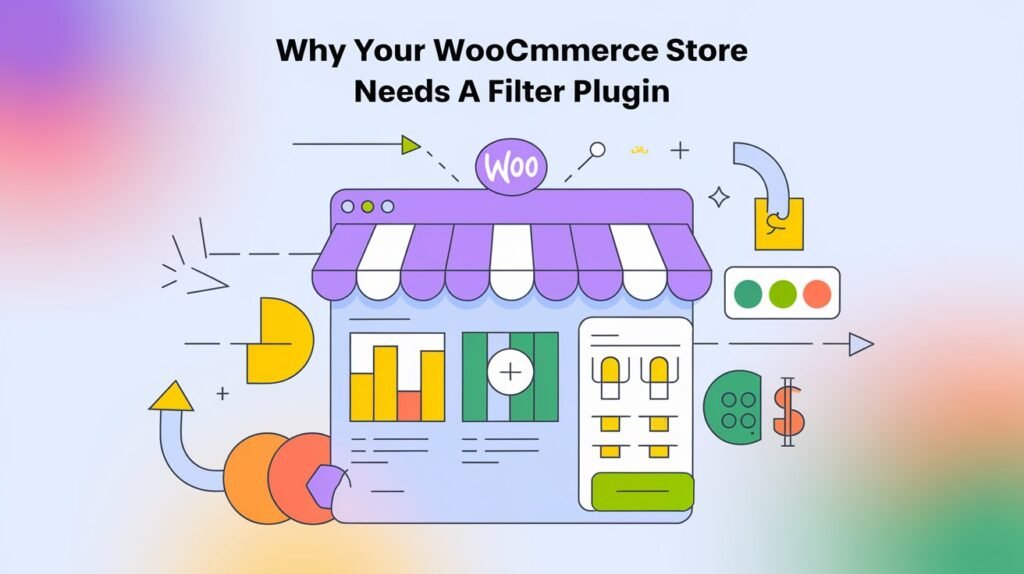
Adding a filter plugin to your WooCommerce store is about more than just convenience—it’s a powerful tool that can improve conversions, enhance user engagement, and boost your SEO performance.
Boost in Conversions
The most important metric for any eCommerce store is the conversion rate. Filters play a direct role in improving this by simplifying the decision-making process for customers. The quicker someone finds what they’re looking for, the more likely they are to buy. Studies suggest that having well-implemented filters can increase eCommerce conversion rates by up to 26%.
By providing a better user experience, filter plugins can directly contribute to increased conversions. When customers can easily find the products they’re looking for, they’re more likely to make a purchase.
For example, let’s say you run an online electronics store. A customer who wants to filter by “price range” or “product rating” is far more likely to find a product they’re interested in. The faster they find what they need, the more likely they are to hit that “Buy Now” button.
Reduced Bounce Rate
Filters can help reduce your website’s bounce rate by keeping visitors engaged and interested. When users can quickly find relevant products, they’re less likely to leave your site.
When users can’t find what they’re looking for, they leave. Simple as that. A filter plugin helps reduce bounce rates by giving visitors the ability to narrow down search results quickly and easily. The more engaged your users are, the more time they spend on your site, and the better your chances are of making a sale.
Imagine someone visiting your store to find a new camera lens. Without a filter to sort by camera brand or lens type, they may become overwhelmed and leave your site to look elsewhere. With a filter plugin, they can quickly refine their search to find only the lenses that work with their specific camera model.
Benefits of Search Engine Optimization
Filters can also have positive SEO implications. By organizing your content and improving your site’s internal link structure, filters can help search engines better understand and index your products.
It’s not just about user experience—filters can also enhance your store’s SEO. By categorizing and organizing your products more effectively, you help search engines better understand your website structure. Filters also contribute to better internal linking, which can help distribute page authority across your site, boosting your SEO efforts.
For example, using a filter plugin that allows for URL indexing of filtered results can help search engines crawl and index filtered content, improving your overall site visibility.
Key Features to Look for in a WordPress Filter Plugin
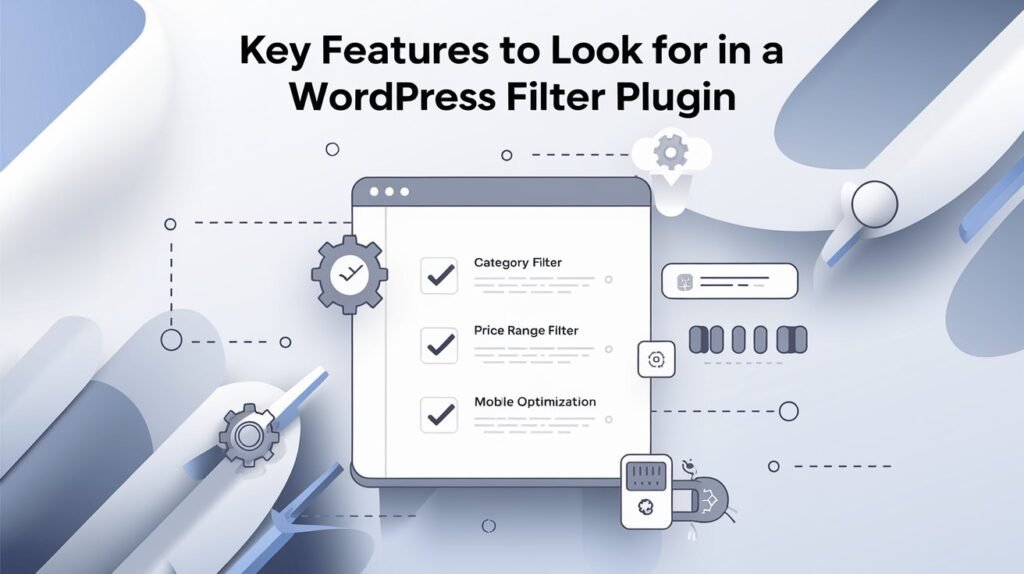
Now that you understand why filters are essential for your WooCommerce store, it’s time to figure out what makes a great filter plugin. Not all plugins are created equal, so you want to ensure you’re picking the one that fits your store’s needs. When choosing a WordPress filter plugin, there are several key features to consider:
Customization Options
A good filter plugin should offer a high degree of customization, allowing you to tailor it to the specific needs of your store. This includes the ability to customize the appearance of filters, as well as the criteria that can be used for filtering.
You need a better filter plugin that’s customizable. Your store has unique products and attributes, so you need a tool that allows you to create custom filters based on your product categories and attributes. Whether you’re filtering by color, price, size, or custom taxonomies, customization is key to delivering the best experience.
For example, if you run a service-based business that offers different tiers of services, you might want a filter that lets users sort by price, availability, and type of service. A plugin with robust customization options allows you to tailor filters to fit your business model perfectly.
Speed and Performance
The filter plugin should not negatively impact your website’s performance. Look for plugins that use efficient coding practices and optimize for speed.
Slow websites lose visitors. It’s that simple. You want a plugin that is lightweight and doesn’t slow down your site. Look for features like Ajax loading, which updates filter results dynamically without refreshing the entire page. This can dramatically speed up your store’s performance and improve the user experience.
Take Filter Plus as an example. It’s designed to provide lightning-fast search filtering without bogging down your WooCommerce site’s performance.
Mobile Responsiveness
As mentioned earlier, your filter plugin should be fully mobile-responsive to ensure a seamless experience for mobile users. Just like I said, mobile eCommerce is growing rapidly. Your filter plugin should be fully responsive and work flawlessly on mobile devices. Mobile users are often in a hurry, so the filter interface must be easy to navigate with clear, tappable buttons and options.
Introduction to Filter Plus – Your Go-To Solution
Now that we’ve covered the benefits of adding filters to your WooCommerce store, let’s talk about a specific solution that checks all the boxes: Filter Plus. 🚀
Why Filter Plus?
Filter Plus is a powerful, customizable plugin built to enhance the search and filtering experience for your WooCommerce customers. It allows you to filter products by custom attributes, such as color, size, and price, or even by custom taxonomies, making it ideal for any eCommerce store.
Whether you’re running a large-scale retail operation or a small boutique store, Filter Plus offers robust options to meet your needs. It’s designed with performance in mind, ensuring that your site remains fast and responsive, even as you add more products and filters.
If you’re looking for a powerful and easy-to-use WordPress filter plugin, Filter Plus is an excellent choice. This plugin offers a wide range of features, including:
- Flexible Filtering Options: Filter Plus allows you to create custom filters based on product attributes, taxonomies, or custom fields.
- Intuitive Interface: The plugin’s user-friendly interface makes it easy to set up and configure, even for those without technical expertise.
- Advanced Features: Filter Plus also offers advanced features, such as AJAX-powered filtering for instant results and integration with popular themes and plugins.
Conclusion
If you’re serious about growing your WooCommerce store and providing the best possible shopping experience, you can’t afford to overlook the importance of filters. WordPress filter plugins not only enhance UX by helping users find exactly what they’re looking for but also contribute to higher conversion rates, reduced bounce rates, and improved SEO.
Whether you’re selling clothing, electronics, or offering services on your WordPress site, a tool like Filter Plus can give your customers the smooth, seamless shopping experience they expect in today’s fast-paced online world.
Ready to get started? Head over to the Filter Plus page to learn more and give your WooCommerce store the edge it needs to succeed.

